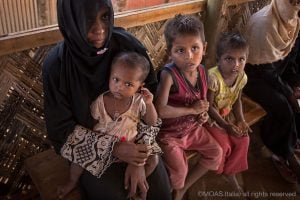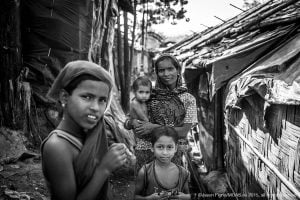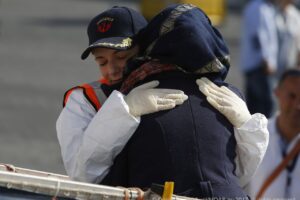I was born in Reggio Calabria and I have spent most of my life close to the sea. By choice or by chance I have always lived near the sea, which has been a constant presence in my life.
For me the sea is not just about geography, but it is more like a friend consoling me with the eternal movement of its waves. Its salty smell and taste, the boats ready to sail, have become fundamental to me over the years.
Nevertheless, the shipwrecks constantly occurring despite the work of MOAS and other SAR entities at sea dampen my happiness when I sit and look out to sea. It is becoming an endless and nameless watery graveyard, where it used to be a place of pleasure and peace.
Since the beginning of MOAS’ mission to mitigate the unnecessary loss of lives at sea, even if I have not visited the entire African continent I have the feeling that I know it, and I can almost see it with my own eyes. After the frantic minutes of the rescues, when we as MOAS crew members are aware that we are fighting for the difference between life and death, I spend time with our guests who have just arrived on board. I have met people from the Gambia, Somalia, Nigeria, Niger, Libya, Syria, Mali, Chad, Ghana, Sierra Leone, Ethiopia and Eritrea, among others. Each of them offered me a shard of their homeland preserved in the memories of their heart.

Once people are finally safe on board and the crew has recovered from the intensity of the rescue operation, all barriers fall apart. No matter if they are emotional, linguistic, cultural or religious, they all fall away. On board the Phoenix there is no rescued nor rescuer: there are just people meeting each other in desperate, but moving situations, and they feel the same wish to share what they have. It does not matter if you speak a different language and you don’t understand each other; your desire to communicate will overcome every linguistic barrier.
We use gestures and speak the universal language of love and mutual, fraternal mercy.
Mercy is mutual because it is mutually given: we are not the only ones who feel mercy and compassion towards the people we rescue after a journey that nobody would like to experience, and they also comfort us when we are exhausted after our rescue activities.
Compassion literally means “to suffer with”, “to suffer together”, and recalls our ability to comprehend others’ feelings and emotions in order to understand events or experiences which are not part of our personal history. This is exactly what happens after rescues: we understand what they have gone through and they “feel” our very same exhaustion or sadness if there have been casualties at sea. In their eyes we can see their love for each MOAS crew member, and their helping hands bear witness to our shared humanity and make our mission so special. They also contradict so much of the fake news that states that those arriving after these deadly journeys do not want to work, but wish to exploit their host country.
My experience has proven that these lies are groundless. I have seen for myself how the people we rescue, even after recovering from such exhausting journey, are just waiting to start their new life. On board they want to help, and pay back the help received from us when they thought they would die at sea. Spontaneously and deliberately they decide to take part in the activities on board to help those who are still too tired.
Unfortunately, after being disembarked and moved to different reception centres, their expectations are too often brutally neglected. They find themselves trapped in a system unable to manage arrivals and recognize their dreams and talent; in this way, not only are their talents silenced, but we are all deprived of all the things they could achieve. The negative story-telling about current migration often depicts people as “parasites” who are detrimental to society or unwilling to work, and ignores that people are often well-educated and previously had a good job and social standing. But it also ignores that many others have not had the chance to access education and are fleeing in order to improve their own living conditions. Nevertheless, our society so often describes them as exploiting their host country instead of seriously considering how much talent is wasted on a daily basis and how negative the approach is to deny them an appropriate welcome.

However, the sea washes all differences away, and makes us all the same. When you are drowning it does not matter where you come from, if you are rich or poor, educated or illiterate. And it is the same when you rescue somebody: no matter who you are, the only important thing is reaching out your helping hand to save that person.
Then, you will communicate through a language that comes from your heart, overcoming all linguistic barriers.
And into this
Immensity my thought sinks ever drowning,
And it is sweet to shipwreck in such a sea
(Giacomo Leopardi)
The original article in Italian was published online by Famiglia Cristiana
Please click here to read the Italian version



